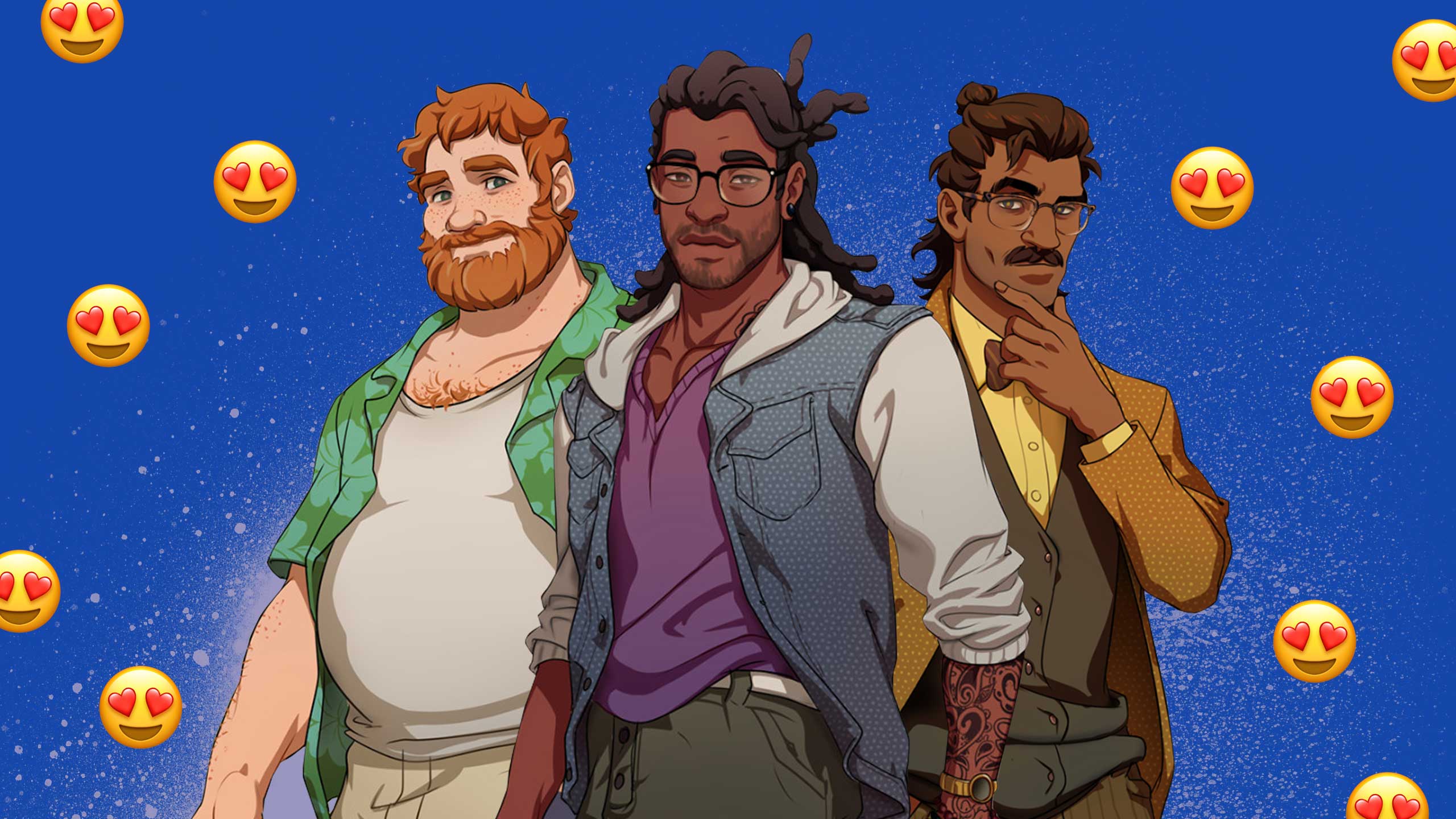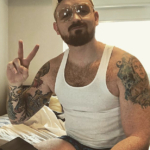I played Dream Daddy dead set on marrying Brian, the husky outdoorsman with kind eyes and ginger hair. Of the seven impossibly delectable daddies––from “cool dad” Mat to “goth dad” Damien––Brian most reflected the men I date IRL, and I knew in my heart that he was the man for me. That is, until we had our second date.
To start, he took me fishing, and I hate fishing. Next, and far more irritating, he is a consummate one-upper. Everything is a competition, including the fish he strong-armed me to catch on this so-called date. And although I had no way of knowing for sure, he looked like a loud chewer—and I hate loud chewers.
“We initially wrote [Brian’s] entire path being a real sweetie pie, and as it turned out, it was extremely, extremely boring,” Leighton Grey, one of Dream Daddy’s creators, tells Xtra. “A story doesn’t work without conflict, and a trope that I’ve always found funny is the weird one-upmanship that can happen between dads. We had so much fun writing him and yet, statistically, he’s the least popular dad. I get it, though. He’s kind of a dick!”
For those living under a rhinestoned rock, Dream Daddy is a smash hit, award-winning dating simulator game, where players assume the role of a single dad who’s moved to a bright suburban town called Maple Bay with his angsty teenage daughter, Amanda. Tapping into our deepest desires, the locale is chock-full of single dads, each one sexier than the last. The game is mainly navigated on a Facebook-style app called Dad Book, where you’re able to contact the dads you want to go on dates with. Each dad offers a completely different experience, from one-night stands that leave you feeling used (relatable) to moonlit picnic dates in graveyards (less relatable).
“Each dad offers a completely different experience, from one-night stands that leave you feeling used (relatable) to moonlit picnic dates in graveyards (less relatable).”
The game has been praised for resisting gay stereotypes and for its inclusivity, particularly in regards to trans folks, who are rarely represented in gaming and, when they are, are portrayed in a much less positive or authentic way. This effort at inclusivity can be observed from the very beginning of the game: When customizing your character, you can select “binder” body options, a garment some trans folks use to flatten breast tissue—a pleasant surprise for trans-identifying players.
“Goth dad” Damien, one of the romanceable daddies, also refers to himself as being trans. But the decision to reference his gender identity could have easily gone unnoticed: The developers didn’t make a big deal about it, so it doesn’t feel like self-congratulatory tokenism or a device for dramatic effect (which is appreciated).
The magic of Dream Daddy is that it presents significant details as insignificant, which allows players the space to interpret a story the way they choose.
“The ambiguity of the player’s gender identity, the player’s comfort level with sex and the player’s age were all things we wanted to leave as open-ended as possible, giving players the opportunity to explore the sexuality of the game on their own terms,” Grey says.
At the beginning, Grey and co-creator Vernon Shaw didn’t intend for Dream Daddy to be a queer game at all. Rather, they envisioned a dating simulator “made for anyone who wants to kiss hot dads.” But as they continued working on the project, they saw an opportunity to write a unique queer story in a way that hadn’t been done before.
“I know firsthand how badly we all just want to see ourselves and our experiences reflected in media,” Grey says. “And not where the gay characters are seen for two seconds or die immediately or their only personality trait is a reductive view of their sexuality. We wanted to make something that was light, fun and allowed these characters to exist as themselves in a really idealized version of the world.”
Fittingly, this idealized world—and all seven of its daddies—were dreamed up in a single day during a visit to the happiest place on earth.
“Leighton and I were on our way to Disneyland when she pitched me the idea of a dating simulator where you play as a dad and your goal is to meet and romance other hot dads,” Shaw says. “It was such an interesting idea that we spent the rest of the day spying on dads in Disneyland to form the sort of archetypes we wanted to work with.”
Grey and Shaw then pitched the idea to their friends at Game Grumps, and the developer happily approved the project. The two then assembled friends and close collaborators and hastily got to work.
Time was limited—they had a year and a half from pre-production to development—so Grey and Shaw wrote the script concurrently with the development of the game, reworking it until the very last minute. Because the two lived across the country from one another (Leighton in Savannah, Georgia, and Shaw in Los Angeles), they brainstormed over Skype and wrote in a shared Google document. The Dream Daddy script came to a whopping 130,000 words (for comparison, the first book in The Hunger Games saga is about 99,750).
Since Grey is a bisexual woman and Shaw is a heterosexual man, they made sure to consult with the gay community to ensure the stories being told were authentic. “Getting this right and having it be both kind and representative was one of the most important things about this project for the team,” Shaw says. “This took the form of reaching out to—and paying—friends and friends of friends who fell under the full spectrum of the LGBTQIA umbrella to run through the script with us.”
“Getting this right and having it be both kind and representative was one of the most important things about this project for the team.”
“We took their feedback, asked questions and generally spent a lot of time reflecting on this stuff,” Grey adds. “At no point did we ever want to seem like we were attempting to speak over gay men, hence why we shied away from engaging with the intricacies of day-to-day queer life that are difficult and scary. We did this because it’s a comedy game. But more importantly, we did this because that’s not our story to tell.”
It was crucial decisions like these that helped make Dream Daddy a smash hit. When released in 2017, the game held the top spot on Steam (an online PC games store with over 125 million users), a space where dating simulators rarely, if ever, make an appearance. It won numerous awards, including Best Visual Novel by PC Gamer and Best Adventure Game by IGN, and birthed thriving communities on Tumblr, AO3 and Youtube, where fans stream playthroughs, write steamy fanfic and create NSFW fan art. The dads have also proven quite popular at conventions.
Grey and Shaw were approached by Oni Press shortly after the game’s release to write a tie-in comic series to further detail the steamy dad-on-dad action. They happily obliged. While many fans were hoping for a sequel, Grey and Shaw felt it would have been “creatively uninteresting” to do another dating sim that was a rehash of the first.
“The comic allowed us to seek a lot of queer talent to bring their own perspectives to the characters they liked,” Grey says. “We gave them the rough beats or concepts for the comics and let them run wild. I couldn’t be happier with how it came out, and I’m so proud of everyone who helped make it happen.”
That said, it’s been four years since Dream Daddy debuted and, admittedly, a lot has changed since then (for better or worse). “Dream Daddy ended up being a project that was very of a time and place,” Shaw says. “In 2017, after Trump was elected, we were seeing a quick degradation of the optimistic sides of the internet, and by the time it was released the game felt like a pointed reminder of optimism.”
If Dream Daddy were released today, you might not recognize it. “There are plenty of things I would do differently,” Grey says. “I’m a completely different person with different creative sensibilities, but what matters is that it exists as it does, and that it touched people in the way that it did. I couldn’t ask for anything more than that.”
In case you were curious, I ended up with “Bad Dad” Robert, who I slept with the day we met and who promptly asked me to leave the minute I woke up. Robert is a tortured soul who whittles, smokes and drinks excessively and adores his rescued Boston terrier, Betsy. Would I have chosen Robert in real life? Not likely, but it was fun getting to know him, especially during a time where human interaction and intimacy––in any form––is limited and/or immoral.
I know it sounds silly, but these fictional dates were intensely comforting. It reflected life as I know it––albeit, an idealized version where everyone is gorgeous and all sexual orientations and genders are validated––and it was nice to escape our waking nightmare and temporarily delude myself. Maple Bay is a real nice place to be, you should visit sometime.


 Why you can trust Xtra
Why you can trust Xtra


